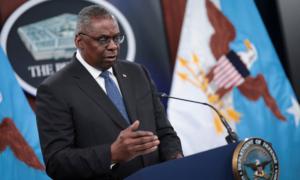The defense secretary returned to work after a nearly month-long absence from the Pentagon.
Secretary of Defense Lloyd Austin will testify to the House Armed Services Committee (HASC) on Feb. 29 regarding a recent incident where he was hospitalized and delegated away critical national security powers without informing President Joe Biden or Congress for several days.
The defense secretary returned to work last week after a nearly month-long absence from the Pentagon that included several days in which he transferred his authority to Deputy Defense Secretary Kathleen Hicks.
White House National Security Council spokesman John Kirby said that President Biden was informed about the transfer of authority to Ms. Hicks on Dec. 22. However, he was not notified at that time why the transfer was necessary, namely that his defense secretary was undergoing surgery and was under anesthesia.
Mr. Austin was discharged the day after his Dec. 22 surgery but was rehospitalized on Jan. 1 after experiencing severe pain. According to a timeline provided by the Pentagon’s press secretary Maj. Gen. Pat Ryder, Mr. Austin’s chief of staff notified the deputy secretary of defense and the White House national security adviser of his hospitalization on the afternoon of Jan. 4. Members of Congress weren’t notified of the situation until the afternoon of Jan. 5.
In a statement to NTD News on Wednesday, a Pentagon spokesperson confirmed Mr. Austin has agreed to testify and face questions from HASC on Feb. 29.
NTD News also reached out to the House committee for comment and further details about the planned Feb. 29 hearing but did not receive a response.
‘I Did Not Handle This Right’
Mr. Austin addressed the hospitalization controversy during a press conference last week, insisting he never directed his staff to keep his hospitalizations a secret but admitting he bears ultimate responsibility for the communication breakdown.
“I want to be crystal clear. We did not handle this right, and I did not handle this right. I should have told the president about my cancer diagnosis. I should have also told my team and the American public. And I take full responsibility. I apologize to my teammates and to the American people,” he said on Feb. 1.
When asked if decisions by members of staff not to notify the White House arose from a general culture of secrecy, Mr. Austin said he couldn’t be certain why his staff didn’t relay more details about his hospitalization.
“I don’t think I’ve created a culture of secrecy. I think there will be security officers, there will be other staff members who may perceive that they’re doing things in my best interest, and, you know, I can’t predict or determine or ascertain what those things may be,” he said.
Mr. Austin was transported to Walter Reed National Military Medical Center on Jan. 1 in an ambulance. One of Mr. Austin’s aides asked the emergency dispatcher to direct the ambulance to arrive without its lights and sirens on, saying, “We’re trying to remain a little subtle,” according to an audio recording of the call.
Addressing that detail, Mr. Austin said, “I asked my assistant to call the ambulance. I did not direct him to do anything further than just call the ambulance. And so what he said in [the call], I think that should come out in the review as well.”
The secretive hospitalization episode came about as U.S. troops are facing heightened security risks in the Middle East, stemming from the ongoing Israel-Hamas conflict in the Gaza Strip. The fighting in the Gaza Strip has shown signs of expanding into a wider regional conflict. Israeli forces have clashed with Hezbollah along Israel’s northern border with Lebanon.
U.S. troops stationed in Iraq and Syria have also come under rocket and drone attacks. The Houthis in Yemen have also launched attacks targeting commercial shipping along the strategically vital Red Sea shipping lane, as an expression of opposition to Israel.
In his press conference last week, Mr. Austin gave his assurances that there were no gaps in responsibilities during his medical episode.
“At every moment, either I or the deputy secretary was in full charge,” he said.
Mr. Austin also said the Department of Defense has adopted new notification policies following this recent controversy.
“In the future, if the deputy secretary needs to temporarily assume the office, the duties of my office, she and several White House offices will be immediately notified, including the White House Situation Room, and so will key officials across the department. And the reason for that assumption of duties will be included in writing,” he said.
Original News Source Link – Epoch Times
Running For Office? Conservative Campaign Consulting – Election Day Strategies!


